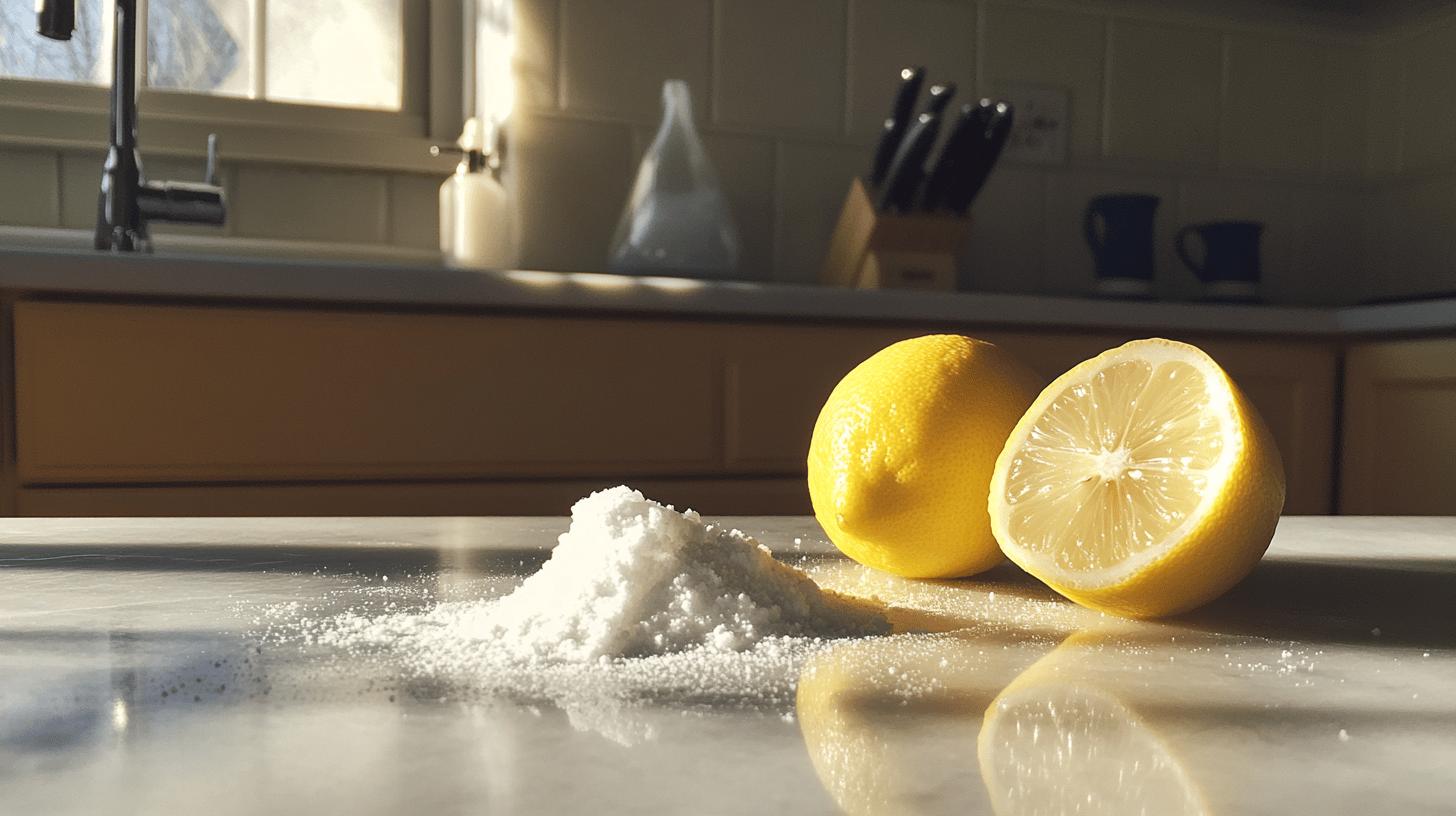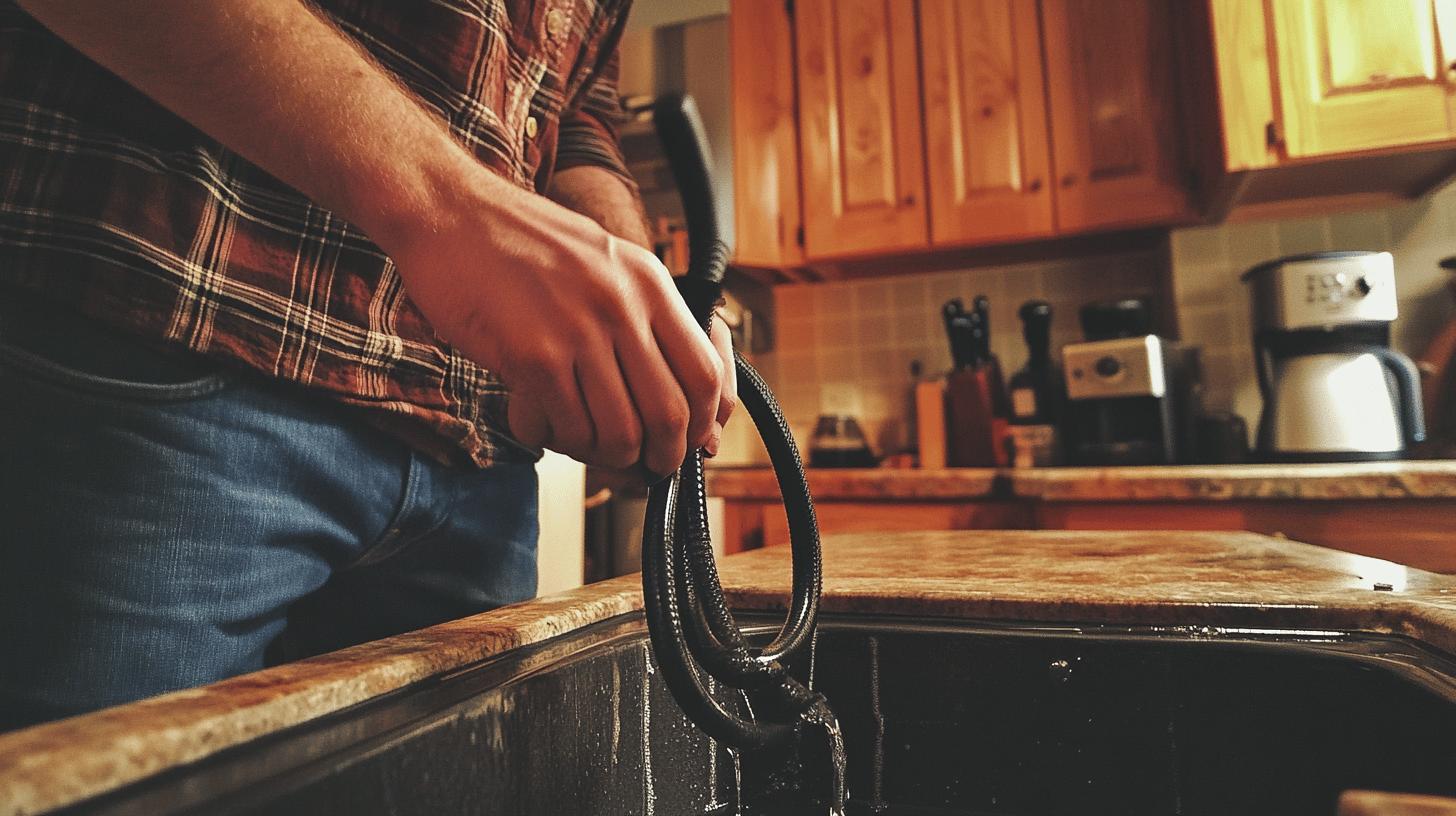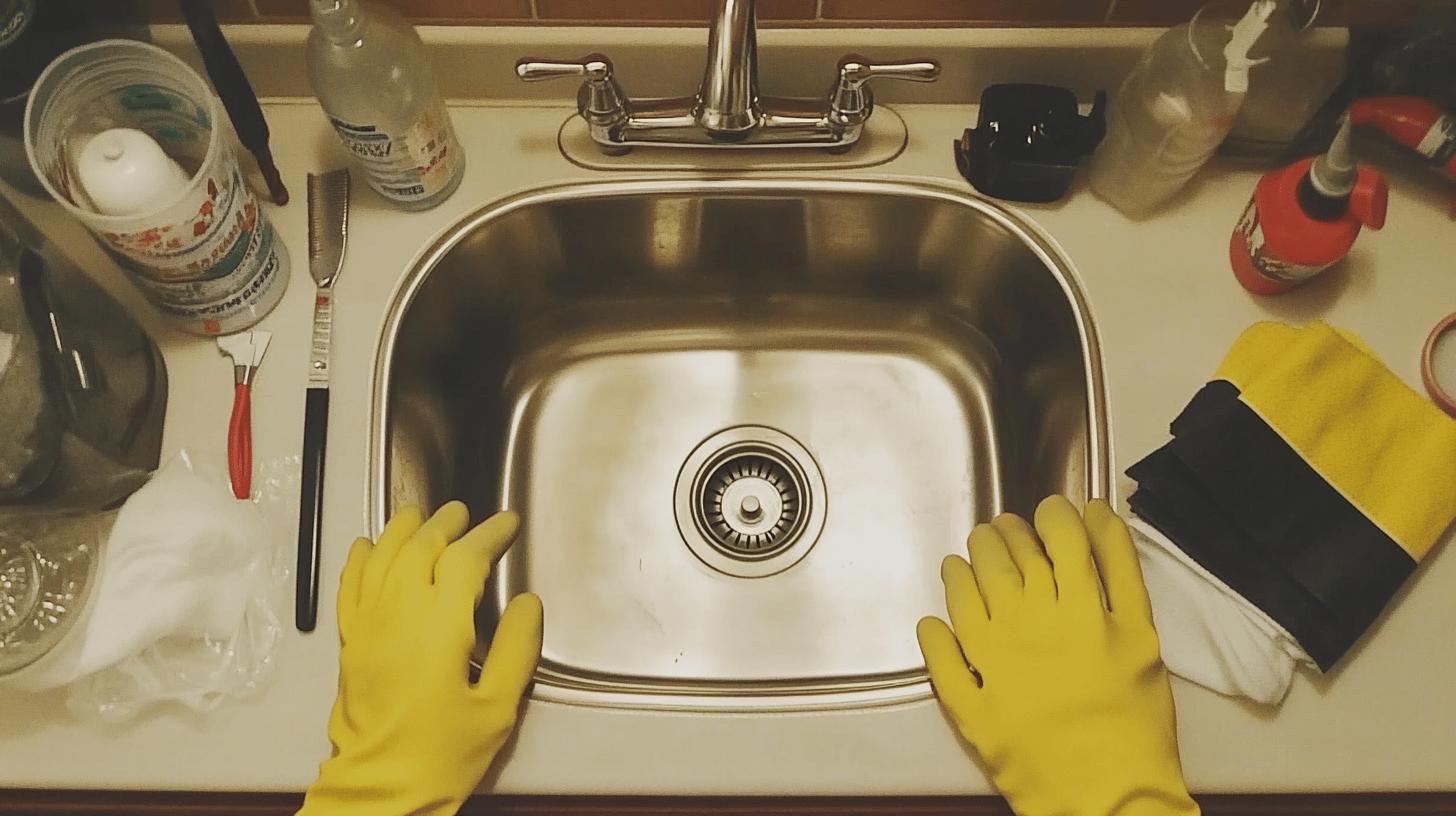TL;DR:
-
DIY Drain Cleaning Hacks: Use household items for minor clogs.
- Boiling Water: Dissolves grease; avoid on porcelain/PVC.
- Wire Hanger: Pulls out hair and debris.
- Baking Soda + Vinegar: Fizzes to break down clogs.
- Drain Snake: Dislodges stubborn clogs.
- Wet/Dry Vacuum: Removes debris.
-
Natural Solutions:
- Baking Soda + Vinegar, Lemon Juice, Salt, Cream of Tartar are eco-friendly alternatives.
-
Kitchen Clogs Causes: Food particles, grease, soap scum. Solutions include boiling water, dish soap, and baking soda.
-
Bathroom Remedies: Use drain snakes, baking soda/vinegar, and hair removal tools.
-
Professional Help: Needed for severe clogs; they use specialized tools and avoid further damage.
Is your sink draining slower than molasses in winter? You’re not alone. Many homeowners struggle with stubborn, clogged drains and try out all sorts of quick-fix solutions. But what if I told you that you don’t have to break a sweat—or your budget—to fix these issues? Check out our guide on “10+ Drain Cleaning Hacks for Effortless Results,” where we share simple, DIY hacks using everyday household items. We’ll show you practical, easy solutions that work, plus tips on avoiding common mistakes, so you can tackle drain problems with real results.
Easy DIY Drain Cleaning Hacks
Want to keep your drains clear without spending much? DIY drain cleaning is a smart, budget-friendly option using things you likely already have at home. These simple methods can tackle minor clogs without the need for harsh chemicals or expensive tools. By using these easy techniques, you can easily maintain your plumbing and prevent stubborn blockages from forming.
- Boiling Water: Slowly pour hot water into the drain to dissolve grease and soap scum. Avoid using on porcelain sinks or PVC pipes to prevent damage.
- Wire Hanger: Straighten a wire hanger, making a small hook at one end, to pull out hair and debris manually.
- Baking Soda and Vinegar: Mix baking soda with vinegar for a fizzy reaction that breaks down clogs. Pour it in, cover, let sit, then flush with hot water.
- Drain Snake: Reach deep blockages with a drain snake to effectively dislodge stubborn clogs.
- Wet/Dry Vacuum: Use a wet/dry vacuum to create suction, removing debris stuck in the drain.
While these hacks are simple, always prioritize safety. Wear gloves when handling baking soda and vinegar mixtures, and be careful with wire hangers to avoid scratching your pipes. Also, make sure your vacuum is rated for wet use to avoid any electrical hazards. Staying safe ensures the cleaning process goes smoothly and without any accidents.
- Sensitive Materials: Avoid boiling water on porcelain or PVC to prevent damage.
- Forcing Tools: Avoid forcing wire hangers or drain snakes, as this may damage pipes.
- Persistent Clogs: For stubborn clogs, seek professional help to avoid further damage and uncover underlying issues.
Natural Drain Cleaning Solutions

Natural cleaning solutions for drains have many advantages over chemical cleaners. They’re safer for the environment and gentler on your pipes. Unlike harsh chemicals that can corrode plumbing, natural ingredients are eco-friendly and leave no toxic residue behind, making them a better choice for both your plumbing and the planet.
| Ingredient Combination | Effectiveness |
|——————————–|————————————————————–|
| Baking Soda and Vinegar | Causes fizzing to break down clogs |
| Baking Soda and Lemon Juice | Dissolves buildup with a fresh scent |
| Baking Soda and Salt | Acts abrasively to clear blockages |
| Baking Soda and Cream of Tartar| Enhances cleaning with added acidity |
Baking soda and vinegar create a fizzing reaction that helps loosen hair and grime without harming your pipes. For routine cleaning, mixing baking soda with lemon juice dissolves buildup and leaves a fresh scent. Baking soda and salt use the salt’s abrasiveness to clear blockages, while cream of tartar adds extra cleaning power with its acidity.
To use these solutions effectively, start by pouring hot water down the drain to loosen any debris. Apply the mixture, cover the drain, and let it sit for at least 30 minutes. Finally, flush the drain with more hot water to wash away any residue. These simple steps keep your drains clean and clear, offering a safe, eco-friendly alternative to harsh chemicals.
Unclogging Kitchen Sinks with Common Items
Kitchen sink clogs are often caused by food particles, grease, and soap scum building up over time, creating stubborn blockages that disrupt your daily routine. Understanding the cause is key to solving the issue. Greasy food and soap solidify in pipes, blocking water flow, but common household items can help clear the problem without harsh chemicals.
- Boiling Water: Pour boiling water to dissolve hardened grease and soap scum, a simple method for minor blockages.
- Dish Soap: Add dish soap to boiling water to break down grease. Soap acts as a lubricant, helping clogs move through pipes.
- Salt: Use salt as an abrasive to clear stubborn blockages. Its gritty texture scrubs away buildup when combined with hot water.
- Baking Soda: Paired with vinegar, it creates a fizzing reaction dislodging clogs.
For the best results, start by removing any standing water. Then, pour boiling water down the drain to loosen the grease, followed by dish soap and more hot water to help push the clog through. For tougher blockages, mix salt and baking soda, pour it into the drain, and let it sit for a few minutes before flushing with hot water again. These methods take advantage of the properties of each item to effectively clear blockages, helping keep your kitchen sink working smoothly.
Bathroom Drain Remedies and Tips

Bathroom drains often clog due to hair and soap scum. Hair can form tangled clumps that trap soap and debris, while soap scum builds up on the pipe walls over time. Addressing these issues early is important to prevent more serious blockages and keep your drains running smoothly.
- Drain Snake: Navigate through plumbing with a drain snake to break up hair knots and soap scum clogs. Rotate it to catch and remove debris.
- Baking Soda and Vinegar: Pour baking soda, then vinegar into the drain. Cover, let fizz, then flush with hot water. This reaction dislodges clogs.
- Hair Removal Tool: Designed to grab hair clogs, these tools easily remove tangled strands, maintaining clear pipes.
Prevent clogs by using drain covers to catch hair, which helps reduce buildup. Regularly flushing your drains with hot water dissolves soap residue and clears minor blockages. By incorporating these habits, you can keep your bathroom drains flowing freely and minimize the need for intensive cleaning.
Professional Solutions for Stubborn Clogs
Severe clogs are often signaled by persistent water backup, slow drainage despite DIY attempts, or foul odors. These signs indicate deeper plumbing issues that may require professional help. If your DIY hacks aren’t working, the problem could be further down the system. Professionals have the tools and expertise to diagnose and resolve complex plumbing issues effectively.
- Ensuring Safety: Professionals use hazardous chemicals like sodium hydroxide safely, protecting your health and home.
- Using Advanced Tools: Equipped with specialized tools, they can clear blockages DIY methods can’t reach.
- Avoiding Pipe Damage: Plumbers prevent damage from improper DIY tool use or harsh chemicals.
While DIY methods can handle minor clogs, professional help is essential for persistent or complex problems. Expert plumbers not only fix immediate issues but also offer advice on preventing future clogs, helping protect your home and ensuring long-lasting solutions.
Final Words
Embracing simple DIY drain cleaning hacks can save you time and money. From using boiling water with baking soda and vinegar to employing a wire hanger, effective solutions are at your fingertips. Choosing natural cleaning methods ensures safety and is eco-friendly. Everyday items like dish soap and salt can tackle kitchen sink blockages, while bathroom drains benefit from baking soda mixtures and drain snakes for hair removal. For tough clogs, professional help may be needed. With these methods, you can easily maintain clear pipes and avoid plumbing headaches.
FAQ
What is the best homemade drain cleaner?
A: The best homemade drain cleaner combines baking soda and vinegar. This mixture creates a fizzing action that helps clear clogs effectively with environmentally friendly ingredients.
What is the hack for cleaning sink drains?
A: Cleaning sink drains can be done by pouring boiling water down the drain, followed by a mix of baking soda and vinegar. This breaks down clogs and can be enhanced by using a drain snake.
What is the best way to deep clean drains?
A: The best way to deep clean drains includes using a drain snake to remove stubborn clogs, followed by a baking soda and vinegar flush to clear remaining debris and sanitize.
Does baking soda and vinegar really work on drains?
A: Baking soda and vinegar work on drains by causing a fizzing reaction that dislodges clogs. They are particularly effective for clearing minor blockages and maintaining drain cleanliness.
How can I unclog my kitchen sink with common items?
A: Unclog your kitchen sink using boiling water, dish soap, salt, or baking soda. These items can break down grease and soap scum effectively when used together or separately.
What homemade method works for bathroom drains filled with hair?
A: For bathroom drains clogged with hair, use baking soda and vinegar. A drain snake or specialized hair removal tool can also effectively remove hair clogs.
Are there any effective hacks for cleaning toilet drains?
A: Toilet drain clogs can be addressed by using a plunger, pouring hot water if safe, or applying a combination of baking soda and vinegar to assist in breaking up the obstruction.

